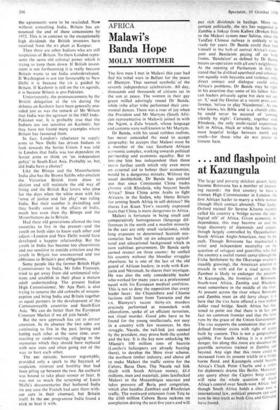AFRICA
Malawi's Banda Hope
MOLLY MORTIMER
The first man I met in Malawi this year had fled his tribal wars in Belfast for the peace of Blantyre. That seemed symbolic- of the seventh independence celebrations. All day, thousands and thousands of citizens sat in the sun at peace. The women in their gay green milled adoringly round Dr Banda, while tribe after tribe performed their cere- monial dances. There was a roar of joy when the President and Mr Martyns (South Afri- can representative in Malawi) joined in with the Ngoni, a Zulu branch, whose language and customs were well known to Mr Martyns.
Dr Banda, with his usual ruthless realism, has never concealed the need to accept geography; he accepts that Malawi must be a member of the vast Southern African economic complex, working towards political partnership and economic equality. But to ima line him less independent than those • 'states further north which rely even more on external aid to bolster their economies, would be a dangerous mistake. Without the usual doublethink, Dr Banda has pointed out that since Communist China trades chrome with Rhodesia, why boycott South Africa? Since China arms Arabs to fight Africans in the Sudan, why blame Britain for arming South Africa in self-defence? He shares Lee Kuan Yew's recently expressed fears that China is more dangerous to Africa.
Malawi is fortunate in being small and comparatively homogeneous (language dif- ferences in the north and a muslim minority in the east are only small variations), while long exposure to determined Scottish mis- sionaries has built up an adequate agricul- tural and educational background which in turn stabilises government. Dr Banda early earned respect on three counts: he unified his country without the bloodier struggles elsewhere; he is one of the last of the old guard of African leaders; in exile with Ken- yatta and Nkrumah. he shares their mystique. He was also the only considerable leader who worked for many years as a professional equal with his European medical confreres. This is not to deny the opposition that every leader faces: the Chipembere and Chiume factions still loom from Tanzania and the us. Blantyre's recent thirty-six murders precisely performed at moondark with chloroform, spoke of an efficient terrorism, not ritual murder. Good jobs have to be found for the young intellectuals, not easy in a country with few resources. In this struggle, Nacala, the Tail-link just opened by the president, may prove both the symbol and the key. It is the key now unlocking Mt Mlanje's 100 million tons of bauxite (Lonrho's helicopters are already buzzing there), to develop the Shire river scheme, the northern timber industry, and above all to make Malawi the traffic centre for the Cabora Bassa Dam. The Nacala rail link (built with South African money, £6.4 millions, men and material), joins landlocked Malawi to the Mozambique seacoast and takes pressure off Beria port congestion, which also handles Zambian and Rhodesian traffic. The westward extension from Tete to the £160 million Cabora Bassa reckons on completion during the next five years and will
pay rich dividends in haulage. More im- portant politically, the ECA has suggested to Zambia a linkup from Kabwe (Broken Hill) to the Malawi system near Salima, since the TanZan Chinese railway is unlikely to be ready for years. Dr Banda could then find himself in the hub of central Africa's trans- port and. Bandaism paying off on both fronts. `Bandaism' as defined by Dr Banda means co-operation with all one's neighbours. At the opening of Parliament in July he stated that he disliked apartheid and colonial- ism equally with boycotts and violence: only direct contact and dialogue could solse Africa's problems. Dr Banda may be right in his assertion that some of his fellow Afri- can leaders privately agree but dare not say so. 'I,' said the Doctor at a recent press con. ference, 'refuse to play Nicodemus'. As one who knows his Bible and is a church elder, he could never be accused of 'coming silently by night'. Certainly, together with Rhodesia, the only multi-racial experiment left in Africa, black or white, he forms the most hopeful bridge between north and south—for those, who do not prefer to foment hate.






































 Previous page
Previous page